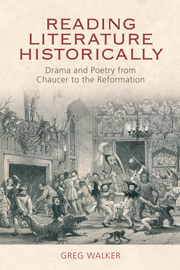Introduction: Literature and History: The Risks of Conversation
Published online by Cambridge University Press: 05 October 2013
Summary
This is a book about drama, poetry and politics in the period from the age of Chaucer and the Gawain-poet to the onset of the English and Scottish Reformations in the mid-sixteenth century. It explores, and hopes to demonstrate, both the potential value and the potential pitfalls of reading the literature and drama of this period ‘historically’, that is, in dialogue with historical events and the political cultures of the communities which produced and received it. The chapters that follow will examine a wide range of dramatic and literary texts from the period, some of which, like Chaucer's Miller's Tale, the late medieval English romance, Sir Gawain and the Green Knight, or the Scottish herald, Sir David Lindsay's monumental drama, Ane Satyre of the Thrie Estaitis (performed variously in 1540, 1552 and 1554) are relatively well known. Others, like the early Tudor Interlude of Godly Queen Hester (?1529) or the anonymous fifteenth-century addition to the Canterbury Tales, The Plowman's Tale, are perhaps less so. What unites each of the chapters is that they take their cue from the late Kevin Sharpe's contention, quoted as an epigraph to this book, that studying the literature of a historical period provides a far richer experience of its culture and politics than consideration of more notionally ‘historical’ documents alone. To read literature historically allows us to see how contemporary men and women deployed the ideas, concepts and symbols that mattered to them and how they represented their own relationships to such ideas and symbols.
- Type
- Chapter
- Information
- Reading Literature HistoricallyDrama and Poetry from Chaucer to the Reformation, pp. 1 - 10Publisher: Edinburgh University PressPrint publication year: 2013



